 |
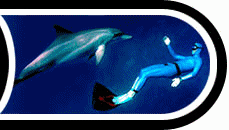 |
text:
©Sebastian Näslund april 2006
Photos: ©Sebastian Naslund/ Annelie Pompe
Two weeks after this article Dahab mainstreet is hit by three terrorist bombs. 24 people die - three foreigners and the rest locals. The freediver Lotta Ericson is sitting only 10-15 meters from the blast. The World champion Sam Still is hurt by shrapnel i the leg.
Part one / Part two
 Dive buddy system. Always one waiting at surface ready to go down and meet in the shallow water blackout area. |
Pushing the limits I dive to 58 meters on a single breath. My preparations started last night. Rest, diet, stretching. I know exactly what to do the last 12 hours up to the last breath. Then I am off - alone into the silence, the pressure and the shadowlands of depth. I pass my bouyancy point and start free falling totally focused on equalization. We freedivers have a technique that can take our ears far deeper than our lungs sometimes approve of. In a magnetic scan I have seen how my throat cartilage folds into itself under this kind of pressure. Looks alarming, but I prefer to call it natural adaptation. I open my eyes just before turning and I see the arch opening up into the sea. Contractions to breath are already riding my lower chest. Even though I am safe down here with lots of oxygen to spare - I call this the death zone. If something happens here Annelie, my safety at surface, will not be able to save me. I have my life in my own hands and I like that. Even though attached with a one meter lifeline to the main diving line Annelie will not be able to pull up the rope and the 12 kilo weight in time. I pull myself up with long hard pulls on the line and try to relax every muscle not needed. Already at 25 meters Annelies fins come in sight just two meters in front of me. I never look up. I never look down. I live life where I am. No stress. With Annelie acompaning me the last meters I at least know I am safe - but I can still blackout from lack of oxygen in the brain. I want my muscles to be anaerobic, but my brain fully oxygenated. These last few meters in the shallow water blackout zone will prove if my dive has been well planned and executed. |
I release half my air below the surface and return to vibrant life as I take my first well needed breaths of air. Inhale - hold - inhale - hold, just as fighter pilots do to avoid unconciousness in strong G-manouveres. When blood falls from your head (and oxygen levels) you faint - you want higher lung (blood) pressure now.
A was two minute dive. Good. Now one day of rest. It takes a long time for blood values to return to normal.
The egyptians can not believe that the scuba guy killed himself. Rumour has it that his neat suicideletter tells of problems with a girlfriend. How can a man that comes from a wealthy country kill himself. Anyone of these local guys would have traded life with him – including the girlfriend. "Girlfriends are always problem", says "Said" and serves us hot lemondrink with honey. The following days I dive, I yoga, but more important I rest when my body tells me.
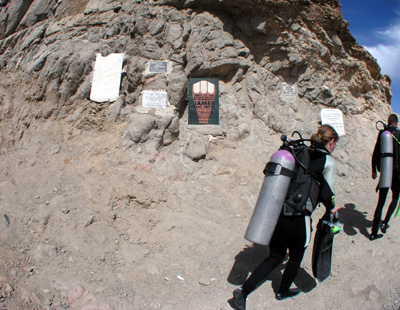 Memories of scubadivers that died in the Blue Hole. Memories of scubadivers that died in the Blue Hole. |
The last dive In two days my flight leaves and its time to measure the line for a personal best. During the training days I have managed the depth of 66 meters. Oxygen consumption and equalization works. I set the line to 70, two meters deeper than my personal best. We have arrived late to The blue hole. All the tourists are leaving - usually fine with me - but today I feel warning signals. What if something happens and Annelie has to deal with me at a deserted blue hole. I look around for scubagroups, they have the oxygen bottles that can save a near drowning victim. They have all gone home. Said at the restaurant thinks the suicide guy faked his death. It was too neatly planned. His letter claims to have paid the driver and the hotelroom and points out where keys and a letter to his father is lying. I look across The red sea, towards the sunset-red mountains of Jordan. Is he there now? |
I find myself thinking about death. I could be dead in half an hour, this could be my last dive. I hate myself for writing this. It just adds on to the faulty myths of freediving. Freediving is safe, no serious damages ever occur among the competetive freedivers in the six freediving disciplines. The no-limit weighted sled discipline is another thing - there 2-3 lifes has been lost.
I remember swedish Mikael Hurtig trying to break the national no-limit record. He got stuck a at depth out here in The blue hole. He tried to push free a jammed sled standing on the bottomweight at 92 meters. It started its´ ascent, but he blackout at surface. The dive was too long. Mikael has three children, I have not seen him freedive for two years. I have neither girlfriend or children - it simplifies freediving training.
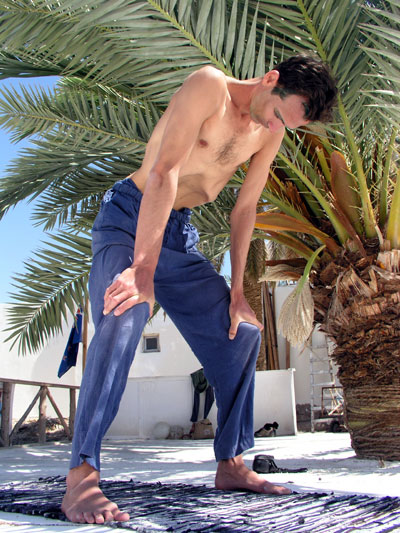 |
I enter the water relaxed but somewhat grimfaced. Am I strange? Thinking about death as a possibility before a dive. I do not know, but it puts my attitude in the right line. This is serious business. I am going down into the death zone. Saying this I still hate it when journalists write things as: "death is a breath away", like we are some kind of romantic suicidals. I stopped boxing and running because of injuries. Freediving has just made me stronger and healthier. A lifestyle, even a curiosity, yes - but more so a sport that I want to be taken seriously. It is about hard training and numbers. According to me freediving is about five things: Equipment, muscles/cardio fitness, technique, strategy and attitude. As I enter the water the three first is now beyond my control. As I take my last breath I have only attitude to deal with. What attitude do you need to dive down into pressure and silence into an enviromnent where you can not breath for minutes? The sun has dissapeared behind the western mountains. I have never dived The blue hole in this shadowy time of day. I take my last breath, take my first pull on the line and close my eyes. I look within. I remember very little of the dive - that is normal. I do this dive in tailormade freediving suit from Eliossub, it gives the right glide and flexibility. Left: Yoga preparation before deep diving on one breath. Working with the diaphragma and the lung volume. |
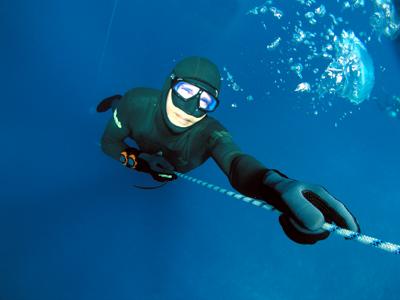 72 meters on one breath |
I am wighted with a neck wight of two kilos and 1.5 kilos on an elastic belt on my hip. At the end of the line I see the yellow tennisball over which my one meter lifeline and carabinerhook can not pass. I feel strong and stretch out beyond the weight 1.5 meters down. Up-up-up. My lungvolume is now 1.2 litres. That is at least half a litre under my residual volume which is the smallest volume my lungs can hold before imploding. The missing half litre is filled out by bloodshift. The inner walls of the lung expands and reduces my lungvolume. Natural adaptation that happens in all of us with the right kind of warm-up. I once wore a EKG machine down to 40 meters. It showed for a few seconds ten heartbeats a minute. It is part of the dive response that saves oxygene. We are adapted to diving deep on one breath. My spleen has under warm-up released extra red blood cells and trapped even more oxygen than normal before this dive. |
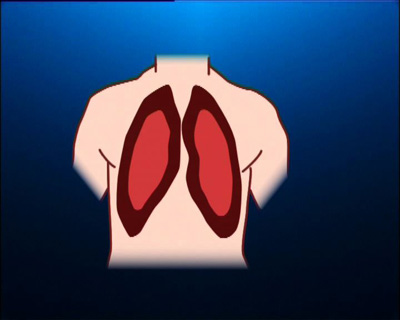 |
The sight of Annelie is welcome. Her silver suit is shining in the last light of the day. Yesterday I had to hold her in a blackout at the surface. Might sound extreeme but a two second unconsciousness has no damage to the body. This is elite freediving, this is our sport, we are pushing the limits as in other sports. But we do it under safe conditions. I held her head above the surface, removed her mask and blowed in her face – this made her breath again like nothing had happened. My faith in Annelie as a safetydiver is 100%. And today on the way up I am totally convinced that I will need her. My body is burning of lactic acid. I just have to get up to the shallower depths where she can save me. In record attempts and competitions there are systems of anti-ballast weights that can pull up the diveline in seconds. Left: Bloodshift. The lungs innerwalls expand and thus reduces lungvolume at depth |
I am too exhausted to look at the my freediver dive gauge ( a Suunto D3). I pant for several minutes. Today Annelie has to cancel her deep dive. I am just not strong enough to deal with a safety dive. This was a maximum performance. No more can be asked of my body. I have redifined my limits. The dive lasted longer than ever before, 2.48 and the depth gauge reads 72.6 meters. I am more alive then ever. But I say to myself: ”Thats it. I will not go deeper”. Maybe I shall start sportclimbing instead.
Sebastian Naslund
